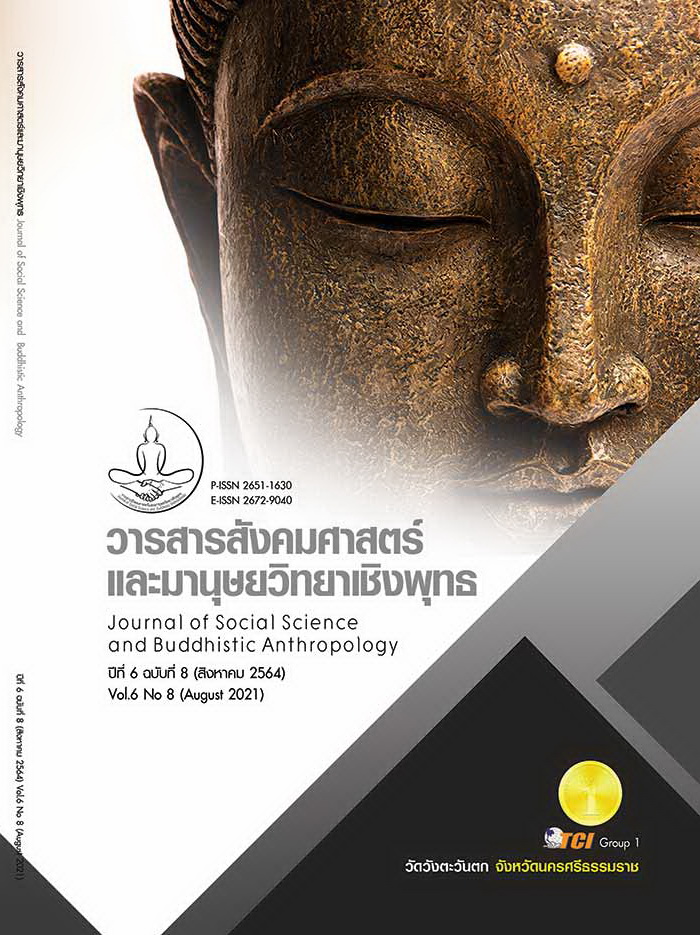PROACTIVE LEARNING MANAGEMENT FOR SOCIAL DISCREPANCIES OF STUDENTS AT SARAPEEPITTAYAKOM SCHOOL CHIANG MAI PROVINCE
Keywords:
Active Learning, Social, Innovation, Social InnovationAbstract
The objectives of this research represents; 1) the study of the active learning education plan of the Secondary students (Mattayomsuksa 4). 2) the development of social innovation based on active learning education plan. 3) the satisfactory of students onto the active learning education plan for social innovation. The sample group in this research was Mathayom Suksa 4 students at Saraphi Phitthayakom School. The research instruments are as follows. 1) Questionnaire for creating a proactive learning management plan for social innovation. 2) A skill assessment form for creativity and social innovation from proactive learning management. 3) Student satisfaction questionnaire towards proactive learning management for social innovation. The results of the research are as follows; 1) The survey result of the active learning education plan for the social innovation of the secondary school students has the average mean score as ( = 3.20, S.D. = 0.74). The evaluation of the active learning education plan for Social Innovation is highly appropriate when applying the active learning for Social Innovation activity to the student learning plan. 2) The result of the Active learning education plan for Social Innovation of the students this indicates the students have highly skill on the active learning for Social Innovation (
= 4.37, S.D. = 0.33). The students have the collaboration skill by following their own objectives, procedures, disciplines and evaluation. 3) The satisfactory of students onto the active learning education plan for Social Innovation results is high satisfactory (
= 3.30, S.D. = 0.78).
References
เนาวนิตย์ สงคราม. (2556). การสร้างนวัตกรรม: เปลี่ยนผู้เรียนให้เป็นผู้สร้างนวัตกรรม. กรุงเทพมหานคร: สำนักพิมพ์แห่งจุฬาลงกรณ์มหาวิทยาลัย.
กรมวิชาการ. (2535). ความคิดสร้างสรรค์ หลักการ ทฤษฏี การเรียนการสอนการวัดผลประเมินผล. (พิมพ์ครั้งที่ 2). กรุงเทพมหานคร: โรงพิมพ์ครุสภา.
กรมวิชาการ. (2545). แนวทางการวัดและประเมินผลการเรียน. กรุงเทพมหานคร: ศูนย์พัฒนาหลักสูตรกรมวิชาการ.
ทิศนา แขมมณี. (2553). ศาสตร์การสอนองค์ความรู้เพื่อการจัดกระบวนการเรียนรู้ที่มีประสิทธิภาพ. (พิมพ์ครั้งที่ 12). กรุงเทพมหานคร: สำนักพิมพ์แห่งจุฬาลงกรณ์มหาวิทยาลัย.
วรางค์ วีระนาคินทร์. (2563). การศึกษาผลสัมฤทธิ์ทางการเรียนจากการสอดแทรกกิจกรรมเรียนรู้เชิงรุก ในกลุ่มวิชาทางเทคโนโลยีการเกษตร มหาวิทยาลัยเทคโนโลยีสุรนารี. สิกขา วารสารศึกษาศาสตร์, 7(1), 22-33.
ศิรพันธ์ ศิริพันธ์ และยุพาวรรณ ศรีสวัสดิ์. (2554). การจัดการเรียนการสอนที่เน้นผู้เรียนเป็นสำคัญ: วิธีการสอนแบบใช้ปัญหาเป็นหลัก. วารสารมหาวิทยาลัยนราธิวาสราชนครินทร์, 3(1), 104-112.
สุวิมล ว่องวาณิช. (2558). การวิจัยประเมินความต้องการจำเป็น. (พิมพ์ครั้งที่ 3 ฉบับปรับปรุง). กรุงเทพมหานคร: สำนักพิมพ์แห่งจุฬาลงกรณ์มหาวิทยาลัย.
Guilford, J. P. (1968). The nature of human intelligence. New York: McGrawHill Book.
Michael, J. A. & Modell, H. l. (2003). Active Learning in Secondary and College Science Classrooms: A Working Model for Helping the Learner to Learn. Mahwah, NJ.: Lawrence Erlbaum Associates.
Panich, V. (2012). A Way to Create Learning for Students in the 21st century. Bangkok: Sodsri - Saritwong Foundation in Thai.









